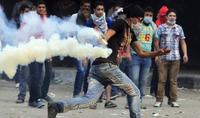-
Modeling terrorism risk to the air transportation system
RAND recently evaluated a terrorism risk modeling tool developed by the Transportation Security Administration (TSA) and Boeing to help guide program planning for aviation security; the Risk Management Analysis Tool, or RMAT, simulates terrorist behavior and success in attacking vulnerabilities in the domestic commercial air transportation system, drawing on estimates of terrorist resources, capabilities, preferences, decision processes, intelligence collection, and operational planning
-
-
Terrorism on decline in U.S.
From 2002 to 2011, the United States has experienced a noticeable decline in terrorism, and North America was the region least likely to suffer from terrorism: there were only twenty-three deaths as a result of terrorism in the United States from 2002 to 2011; the three most active perpetrators of terrorist acts in the United States have been the Earth Liberation Front, Animal Liberation Front, and various anti-abortion activists; al Qaeda and affiliates, the Taliban and affiliates, the KKK and affiliates – combined — accounted for less than 3 percent of terrorist attacks in the United States in the past decade
-
-
Israel to test advanced Arrow 3 anti-missile missile

The official in charge of developing Israel’s missile defense system said yesterday that in the coming days Israel would conduct a test of the advanced Arrow 3 missile; the Arrow 3 has been developed to shoot down Iranian ballistic missiles on their way to Israel; the Arrow 3 has been designed to intercept missiles carrying nuclear warheads – and intercept them outside the atmosphere
-
-
U.S. denies Iran’s claim that it had captured a U.S. surveillance drone
Drones are used extensively by the United States to monitor not only Iran’s nuclear activities, but also its military moves on land and at sea. Iran’s state television reported on Tuesday that Iran’s Revolutionary Guards Corps naval forces captured an American drone that entered Iranian airspace over the Persian Gulf. The U.S. Navy quickly denied the claim
-
-
The Assad regime moving chemical weapons closer to delivery vehicles
Over the weekend, the besieged Assad regime has begun to move chemical munitions out of storage to military bases where the delivery vehicles for these weapons are based; the move of these munitions was captured by U.S. and Israeli intelligence assets, and confirmed by human sources inside the regime; the readiness of the regime to place chemical warheads right next to the weapons – missiles, planes, tanks, and artillery – which will deliver them has dramatically increased the sense of alarm in the region, in Europe, and in Washington
-
-
New York is home of the terror bar
Islamic terrorists from around the world are being extradited to the Federal District Court in Manhattan or Brooklyn to face prosecution, which is a boon for the qualified lawyers who defend them; the skills these lawyers display often go beyond what can be taught in law school
-
-
Increase in negative messages about Muslims in the media: study

Organizations using fear and anger to spread negative messages about Muslims have moved from the fringes of public discourse into the mainstream media since the 9/ 11 attacks; to reach these conclusions, a University of North Carolina sociologist used textual detection software to track the influence of 1,084 press releases about Muslims from 120 organizations on more than 50,000 television transcripts and newspaper articles produced from 2001 to 2008
-
-
Egyptian assembly to vote on a new constitution today

Egypt’s National Assembly speaker Hossam el-Gheriyan said that the vote on a new constitution – expected to be held today — would be the only way to quell public anger over President Mohamed Morsi’s sweeping decree, which shields his decisions from judicial or parliamentary scrutiny; observers and leaders of the secular opposition are less sanguine; the new Egyptian constitution will be based on the strict Islamic Sharia law; it is not easy to see how the liberal and secular forces which pushed Mubarak out of power nearly two years ago would readily welcome a legal system which, in some respects, would make Egypt look like Saudi Arabia
-
-
Lockheed Martin demonstrates ground-based laser system against short-range threats
Lockheed Martin has successfully demonstrated a portable, ground-based military laser system in a series of tests against representative airborne targets; the Area Defense Anti-Munitions (ADAM) system aims to provide a defense against short-range threats, such as rockets and unmanned aerial systems
-
-
Part One: Don’t blame the security guard at Y-12
On 28 July 2012, using only wire cutters and flashlights, peace activist Sister Susan Rice, 82 years of age, and two other confederates – both senior citizens themselves — successfully bypassed the elaborate, and expensive, security system around Y-12 National Security Complex at Oak Ridge, Tennessee; though the lone security guard at Y-12 has become a convenient scapegoat, it now appears that the breach reflects system-wide security and safety concerns at nuclear facilities under the National Nuclear Security Administration (NNSA); the breach is best understood as the end result of long standing management and organizational failures within and between DOE, NNSA, and NNSA’s private contractors; the NNSA, in fact, appears burdened by many of the same issues it was created in 2000 to resolve
-
-
Israel successfully tests David’s Sling mid-range missile defense system
During the just-ended Operation Pillar of Defense, Israel made military history by successfully employing a missile defense system to protect the country’s population: during the 8-day war, Hamas and Islamic Jihad launched 1,506 rockets and missiles at Israeli towns and cities; of those, 1,057 fell harmlessly in empty fields, but 449 were headed toward populated centers; of the 449, Israel’s Iron Dome system intercepted 421, and 28 hit buildings, killing five; yesterday Israel announced the successful test of David’s Sling, a mid-range missile defensive system; the system is designed to protect against missile with a range of up to 180 miles, like the missiles in the hands of Syria and Hezbollah
-
-
Gaza cease-fire depends on Egypt's commitments
The cease-fire agreement between Israel and Hamas, which was supposed to be announced Tuesday at 21:00, is on hold because Israel was unsatisfied with the mechanisms aimed to prevent the rearmament of Hamas by Iran; Egypt’s commitment is key here; Israel does not trust Hamas and regards formal agreements with the organization as worthless; Egypt is in a perfect position to be the guarantor of any agreement with Hamas
-
-
Israel, Hamas on verge of cease-fire deal – or ground war

The Israeli government yesterday (Monday) postponed a decision on a ground invasion of the Gaza Strip — inside sources said the decision was to postpone the green light for an invasion for twenty-four hours — as intense negotiations in Egypt continue in an effort to reach a cease-fire agreement between Israel and Hamas
-
-
Also noted
King to give up Homeland Security chairmanship | Syrian Islamist rebels reject West-backed opposition coalition, declare Aleppo Islamic state | Pentagon sees seizing Syria chemical arms as vast task | Iran’s first nuclear plant may have suffered new setback | UN nuclear agency: Iran poised to expand nuke work | Germany abandons nuclear power and lives to talk about it | Police-worn cameras being tested in West Valley | License plate scanners under fire | Fed ID Deadline Looms For N.M.| Ban ‘killer robots,’ rights group urges | Houston airport system embraces technology to share wait times for security checkpoints | Man with strange watch arrested at California airport
-
-
NYC bomb plotter sentenced to life

Adis Medunjanin, a 34-year old Bosnian-born U.S. citizen has been sentenced to life in prison for his role in a plot to bomb the New York subway; he was convicted in May of multiple U.S. terrorism offences, including conspiring to use weapons of mass destruction; two former schoolmates who helped Medunjanin to plan the attack had pleaded guilty and testified against him
-
More headlines
The long view
What Does Netflix’s Drama “Adolescence” Tell Us About Incels and the Manosphere?
While Netflix’s psychological crime drama ‘Adolescence’ is a work of fiction, its themes offer insight into the very real and troubling rise of the incel and manosphere culture online.
